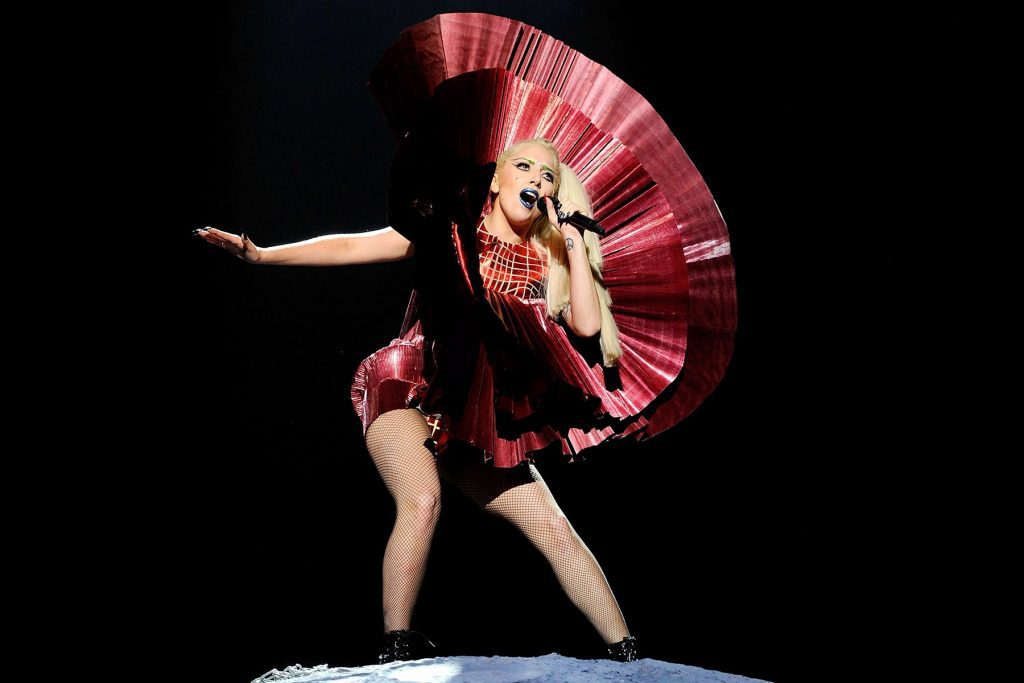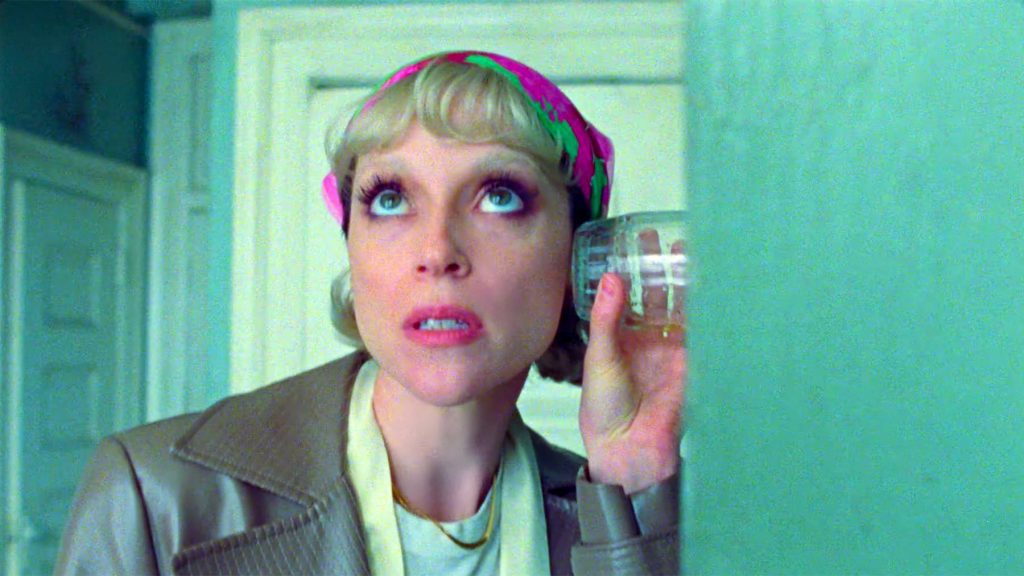
Japanese Breakfast’s Michelle Zauner on Making Her Brightest Record Yet
When Michelle Zauner thinks about her latest album as Japanese Breakfast, she thinks of persimmons. “Persimmons are pretty present in a lot of Asian cultures, as gifts that you give to people,” she says over the phone from her home in Brooklyn. “I had seen an image of these hanging persimmons that are dried during the winter and turned into sweet, dried fruit. And I really like the idea of this very bitter, hard fruit before it’s ripened — on display and slowly maturing and turning sweeter and letting its environment impact it. It felt like a very fitting metaphor for where I’ve come from.”
Jubilee, out June 4th, arrives on the heels of Crying in H Mart, Zauner’s heart-wrenching memoir about her late mother and the Korean food they bonded over. While the first two Japanese Breakfast records — 2016’s Psychopomp and 2017’s Soft Sounds From Another Planet — grappled with that grief, Jubilee embraces joy. “It feels like a summer album to me,” Zauner says. “I knew that I wanted my third album to be the most drama and the strongest foot forward — every muscle flexing and using all the tools that you have in the toolbox. Because by the third record, you should really know who you are and what you want to be doing as an artist. And I really wanted to go all out for it.”
blogherads.adq.push(function () {
blogherads
.defineSlot( ‘medrec’, ‘gpt-dsk-tab-article-inbody1-uid0’ )
.setTargeting( ‘pos’, [“mid-article”,”mid”,”in-article1″,”mid-article1″] )
.setSubAdUnitPath(“music//article//inbody1”)
.addSize([[300,250],[620,350],[2,2],[3,3],[2,4],[4,2]])
;
});
The album’s lead single, “Be Sweet,” feels a little poppier and less in the indie-rock direction you’re known for. How did that happen?
I was really worried that everyone was going to get mad at me and think I was, like, going full-on pop, but I think a lot of people really liked it. Even our fans are like, “She always does this thing where she puts out a song and it doesn’t sound like the rest of the record.” [Laughs.] I think that I’ve built up a bit more trust. “Be Sweet” is obviously our poppiest song. It feels like the most like radio-ready of the songs that I’ve put out. It very much has a chorus, but I think the rest of the songs are really wacky and weird.
I’m obviously a poptimist. I especially like pop music that isn’t formulaic and has depth to it. I was really cognizant of that going into this album. I think as a lot of indie bands get bigger, it’s a very obvious move to pivot to the pop realm, because you’re kind of like, “What’s going to get me into a bigger room?” But I wanted to make sure that I was well-intentioned with my music. I was very scared of making a poppy record.
Did any artists inspire you to dabble in pop, without completely pivoting that way?
I was influenced by artists like Björk and Kate Bush, these women who are essentially pop musicians with mass appeal — but they’re both really fucking weird. I wanted to lean into the surreal quality that they bring to their work, and what makes them so unique. Alex G is another example of someone who I think writes pop music, but is such a singular voice. That’s what makes him so compelling. And that’s what I wanted to find in myself for this record.
Alex G lends a hand on here, as well as Wild Nothing’s Jack Tatum and others. What did those collaborations contribute to the record?
Well, they each had their own kind of song. Craig Hendrix is someone I’ve worked with a lot; he’s a live drummer, and he co-produced Soft Sounds From Another Planet and this record. I was really nervous that Psychopomp was an absolute fluke and that I was going to suffer severely from the sophomore slump, so I wanted to create a very, very insular environment where I felt very comfortable exploring [for Soft Sounds].
With this new record, I wanted to invite more people into our world, and the two of us would sort through the pieces together. I definitely did fuller demos for this album than I had before. Jack brought his own creative flavor to “Be Sweet” and “Posing in Bondage,” and Alex really opened me up. “Savage Good Boy” is just a really weird song. I tried to take the best parts of all my collaborators and showcase [them] on this record.
blogherads.adq.push(function () {
blogherads
.defineSlot( ‘medrec’, ‘gpt-dsk-tab-article-inbody2-uid1’ )
.setTargeting( ‘pos’, [“mid-article2″,”mid”,”in-article2″,”mid-article”] )
.setSubAdUnitPath(“music//article//inbody2”)
.addSize([[300,250],[300,251],[620,350],[2,4],[4,2],[3,3]])
;
});
“Paprika” is such a triumphant way to kick off the record. Why did you choose to open it with that one?
I felt like there was no question that the album had to open with “Paprika.” I actually fought with the label to make sure that it wasn’t a single. It felt like such a thesis statement for the album. We really went all out for that one. The strings and horns — it was everything that I wanted. The song is so much about forcing yourself to revel in music-making and really feeling what you have to offer and making sure that that’s really real — that you really deserve to be in this position that you’ve staked out for yourself. I specifically wanted it to not be a single, because I’m excited for people to listen to it as the opener of a record without having heard it before.
You mentioned strings and horns, which are all over this album. How did those sounds come to play such a big role?
I had a lot more confidence than I had before. I never would have thought to write that kind of stuff. Part of it came from having a wonderful collaborator like Craig who is able to do that and also encouraged me to try my hand at it. But also, I got to meet a lot of fantastic musicians over the past three years that we’ve gotten to play with live, like Adam Schatz, who plays saxophone with us sometimes, and Molly Germer, who plays violin with us.
It was getting to meet all these great musicians in your life that help you not be intimidated. For a long time, writing arrangements for strings and horns was so mysterious and sounded like something that only like classical composers could do. But nowadays it’s so easy to write like that on keyboards and stuff. If you have this network of musicians that you don’t feel stupid around, it makes it a lot easier to have those things come through it.
How much of the theme for this album is joy?
I had the title Jubilee for a long time. The main theme was going to be joy, but of course, the 10 songs aren’t all about being happy. They’re about different ways that we interact with joy — if it’s a struggle to feel joy, or it’s a reminder to feel joy, or if it’s doing something to sustain joy, or walking away from someone or something to experience joy or preserve joy. That to me is what the theme of the record is.
The record has darker moments too, especially towards the second half.
I tend to put the bangers up top and then slowly get sleepier, like on mixtapes. That was always the arc that I’ve been drawn to creating in a playlist. The sadder songs for me — like “Tactics” is very much a song about the things that you have to do to protect your joy. Sometimes it’s about walking away from an environment, and you have to make a tough decision to negotiate your joy over someone else’s.
blogherads.adq.push(function () {
blogherads
.defineSlot( ‘medrec’, ‘gpt-dsk-tab-inbodyX-uid2’ )
.setTargeting( ‘pos’, [“mid”,”mid-articleX”,”in-articleX”,”mid-article”] )
.setSubAdUnitPath(“music//article//inbodyX”)
.addSize([[300,250],[300,251],[3,3],[620,350]])
.setLazyLoadMultiplier(2)
;
});
There are also songs where you step into other perspectives, like “Savage Good Boy” and “Kokomo, IN.”
All the songs are about me and not about me, in a way. “Savage Good Boy” very much came from the line “Billion dollar bunker for two.” That was something I read on the news about billionaires buying bunkers, and I was inspired to write a song from the perspective of a billionaire coaxing a young woman to live with him in his bunker and hide from the collapse of the world. I was just interested in investigating that perspective of how a billionaire can rationalize a hoarding of wealth on such a high level and rationalize it to be about survival in some way. I think that everyone has some amount of greed inside of them and can rationalize certain types of bad behavior. But when it gets to be that high of a level, I’m fascinated by the people who are able to do that.
For a song like “Kokomo, IN,” I don’t have that type of longing the way that most teens do anymore, but that’s certainly what makes a more interesting song. So I wanted to put myself back into position of being 18 and losing a love. But it’s seen from this more mature lens, where a young boy is saying goodbye to his girlfriend who’s gone off to a study abroad in Australia. It’s a very sweet song. Like, “It would be selfish to keep you here in this small town, and you’re about to show off to the world, the parts I fell so hard for. And I’m sad about it, but ultimately, the world deserves you far more than just little me.”
Last year, you collaborated with Crying’s Ryan Galloway on an EP under the name Bumper, and he also appears on Jubilee. Do you see a through line between those two projects?
That EP is very much just a marriage of Ryan’s and my interests. It was a pretty quick process that was all connected over the internet. But I think the same kind of earworm sensibilities that I strive for are present there.
Jubilee arrives right on the heels of Crying in H Mart. Did becoming an acclaimed memoirist affect how you see yourself as a songwriter?
[Laughs] I don’t think it impacted me very much. I just try to do my best in both mediums. I try not to think about any of the validation I’ve received ,and just focus on what I like and doing to the best of my ability. I think it’s dangerous to rest on any type of laurel.




